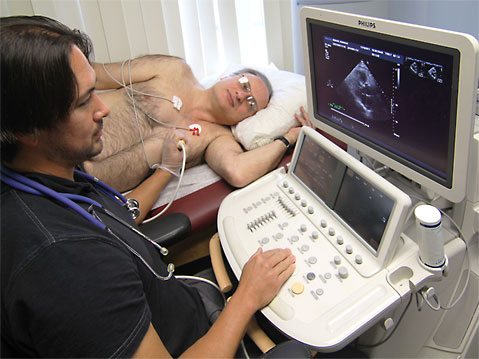Echocardiography
An echocardiogram is a non-invasive test that uses ultrasound to image the heart muscle and heart valves. It will look at blood flow both in the heart chambers and through the heart valves along with the overall pumping function of the heart.


How do I prepare for the procedure?
- Wear clothing that is loose-fitting and easy to remove.
- You might be instructed to avoid food or drink six hours before test if you will have a pharmacologic stress echocardiogram.
- Most of the time, you should not have to take special precautions.
How Is the Test Performed?
You will be asked to remove all clothing covering your chest, and put on a hospital gown. A cold gel will be applied to your chest where the sensor (transducer) will touch. The lights will be dimmed so that the technologist can better see the image of your heart on the screen. Pay attention to the instructions given. At various times during the test, you might be asked to move in one direction or another or hold your breath. Most echocardiograms can last between 30 and 90 minutes, depending upon the type given.
If you will have an exercise stress echocardiogram, after your baseline image is taken, you will then get on a treadmill or an exercise bike for a prescribed time while a second echocardiogram is taken. Following the initial echocardiogram, you could also have a pharmacological stress echocardiogram. Drugs will be injected through an IV, and another echocardiogram will be taken. After the procedure, you should be able to go home. If you had a pharmacological echocardiogram, you might experience nausea, heart palpitations (fluttering), chest pain, headaches, or flushing. If you find that you have severe chest pains or dizziness, talk to your doctor.
Is It Safe?
Echocardiograms are safer than other monitoring and imaging tests, since it does not use large magnets like an MRI or radiation like x-rays. The technology used in an echocardiogram is so safe that it is used to see an image of babies in the womb. Depending upon the type of echocardiogram your doctor is taking, you will likely feel nothing during the test and have no ill aftereffects. Even implanted echocardiograms are considered safe. Discuss any concerns you have with your doctor.
